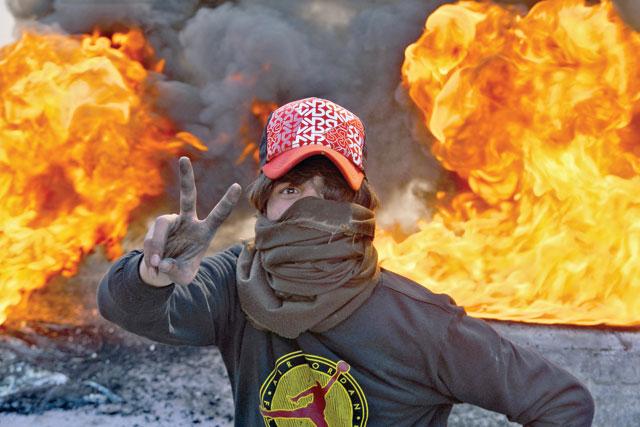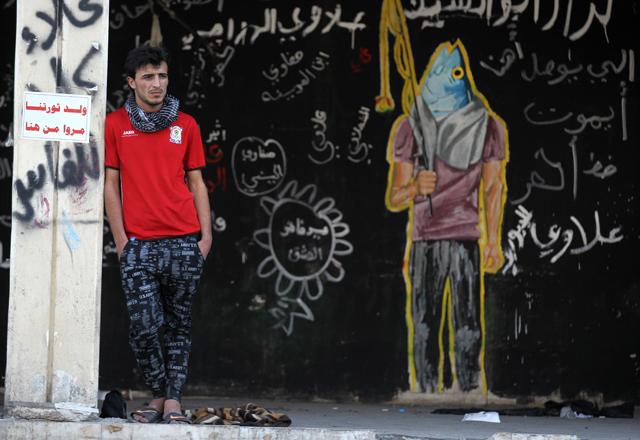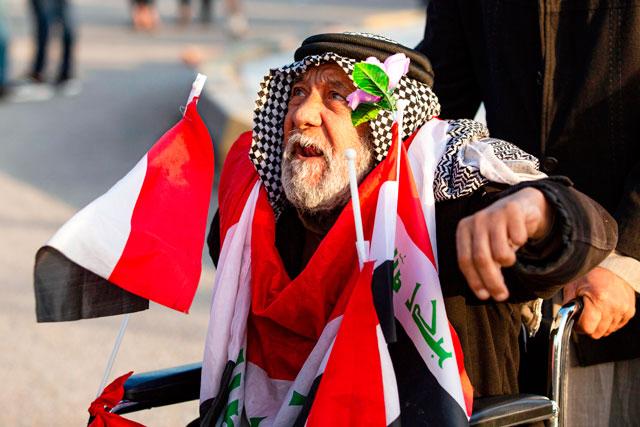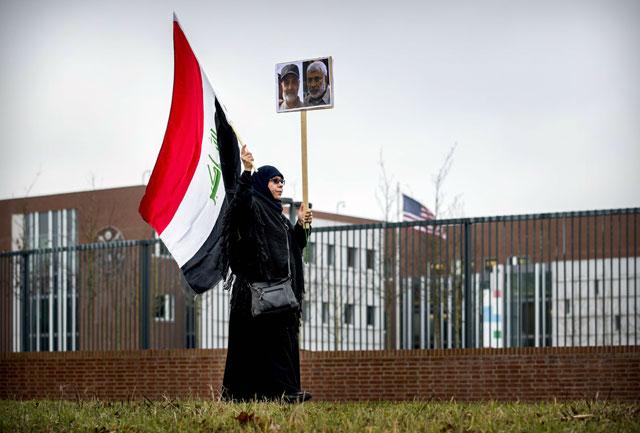You are here
Iraq protesters rebuild torched camps as rocket attack sparks fears
By AFP - Jan 28,2020 - Last updated at Jan 28,2020

A masked anti-gov't protester flashes the victory gesture as he stands before flaming tyres at a make-shift roadblock in the central Iraqi holy shrine city of Najaf on Monday (AFP photo)
BAGHDAD — Anti-government demonstrators rebuilt torched protest camps across Iraq on Monday, seeking to keep up their movement's momentum after a rocket attack on the US embassy in Baghdad threatened an escalation.
The attack, which wounded one person, marked a dangerous shift after volleys of rockets in recent months targeted Iraqi military bases where American troops are deployed.
No faction has claimed responsibility, but the US has repeatedly blamed Iran-backed military factions for previous incidents.
The latest attack sparked renewed fears that Baghdad could be dragged into a conflict between Tehran and Washington, weeks after tensions spiked following the US killing in Baghdad of a top Iranian general.
Anti-government activists fear such a conflict would derail their movement, the largest grassroots campaign Iraq has seen in decades.
They also fear a crackdown after losing the support of powerful Shiite cleric Moqtada Sadr, who backed the rallies when they first erupted then abruptly changed his mind Friday after holding his own anti-US rally.
University students have carried the torch, gathering in the thousands in Baghdad and the Shiite-majority south to insist on their demands and affirm their political independence.
“When we first came out to protest and hold sit-ins, we didn’t commit to the narrative of the Sadrist movement or any other political party,” said Zainab Mohammad, a university student in the shrine city of Karbala.
“We came out on our own, and we will continue until our demands our met,” she said.
Funeral march in Najaf
Protesters are demanding snap elections, an independent successor to resigned prime minister Adel Abdel Mahdi and the prosecution of those implicated in corruption or recent bloodshed.
Angered by a lack of progress, they began ramping up pressure a week ago, sealing streets with burning tyres and metal barricades. Riot police have responded with live rounds and tear gas.
Early on Monday, unidentified gunmen stormed a protest camp in the flashpoint southern city of Nasiriyah and torched tents, an AFP correspondent there said.
The attackers fired on activists who had been sleeping there, killing one and wounding four others, a medic said.
But hours later, determined protesters had erected new tents and even built a one-room cement installation, signalling their determination to stay put.
In the oil-rich but impoverished port city of Basra, student protesters reerected tents dismantled by authorities over the weekend, AFP’s reporter said.
The main protest camp in the Shiite holy city of Najaf was also burned down overnight by unidentified gunmen, but protesters jumped into action on Monday morning, blocking roads with burning tyres.
In the early afternoon, a funeral march made its way through the city to mourn the young man killed earlier in the day in Nasiriyah, identified as 14-year-old Ali Zuweir.
Relatives carried Zuweir’s coffin through Najaf, a favoured burial place for Iraqi Shiites, holding up his portrait and weeping loudly.
This week’s uptick in violence has killed 21 protesters, bringing the toll since October close to 480 dead, the vast majority demonstrators, according to an AFP tally compiled from medics and security sources.
PM warns of broader war
Sadr’s march on Friday saw thousands turn out to demand American troops leave the country, after the US used Iraqi airspace to carry out a drone strike on top Iranian and Iraqi officials on
January 3.
Outraged, Iraq’s parliament voted on January 5 in favour of ousting all foreign forces, including the 5,200 US troops deployed in Iraq.
Pro-Iran factions in Iraq, particularly those tied to the Hashed Al Shaabi military force, had long lobbied for the ouster of American forces.
On Monday, top Hashed commander Qais Al Khazali said any candidate being considered to replace Abdel Mahdi, who has stayed on in a caretaker capacity, must pledge to execute parliament’s vote and oust foreign troops.
Other conditions for the new premier included holding snap parliamentary elections by the end of the year and implementing a landmark development deal with China.
Washington has blamed hardline Hashed factions, including Khazali’s Asaib Ahl Al Haq for rocket attacks on the US embassy and American troops in recent months.
On Sunday evening, three rockets slammed into the US embassy in Iraq’s capital, wounding one person, according to a senior Iraqi official and a US diplomatic source.
No details were available on whether the casualty was a US national or an Iraqi member of staff at the mission.
The US embassy did not respond to requests for comment, while the US State Department called on Iraq to “fulfil its obligations to protect our diplomatic facilities”.
Iraq’s foreign ministry said the attack would not impact US-Iraqi relations, although Abdel Mahdi and parliament speaker Mohammed Halbusi said the incident risked dragging their homeland into war.
Related Articles
BAGHDAD — Anti-government demonstrations that erupted in Iraq on October 1 have escalated into its deadliest protest movement in decades, co
BAGHDAD — US air strikes against a pro-Iran group in Iraq killed at least 25 fighters, a paramilitary umbrella said on Monday, triggering an
BAGHDAD — Iraqi armed factions called on Tuesday for an urgent meeting to face "the war against the resistance", after a US strike on Baghda



















